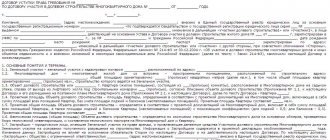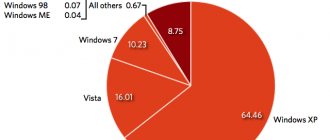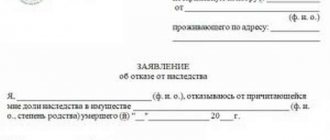Let's start with the fact that the procedure for common shared ownership is regulated by Article 244 of the Civil Code of the Russian Federation. It is necessary to distinguish between such concepts as shared ownership, when a share is determined for each of the owners, and joint ownership, when the shares are not defined. The disadvantages of joint ownership of real estate are obvious:
- Without the consent of the co-owners, it is impossible to make repairs or install air conditioning in the apartment;
- you cannot register yourself or your family members in the apartment unless there is the consent of other participants in shared ownership;
- the law establishes the right of first refusal - before selling the ownership of his share to a third party, the owner is obliged to offer it to other participants in the property at the price at which it is sold;
- a share in an apartment represents some virtuality, so selling a share in joint ownership is much more difficult than with a dedicated share;
- it is not possible to rent out a share in the apartment; this requires an agreement on the joint disposal of property and the allocation of a share in kind;
- if there is a creditor, there is a possibility of receiving from him a demand for the allocation of the debtor’s share from the common shared property. If the allocation of a share is impossible or other owners object to this, the creditor has the right to demand the sale of the share by the debtor to the remaining participants in the common shared ownership at the market price.
Division of an apartment in shared ownership
Common shared ownership right is the right when the shares of each owner from the common property are determined. Allocation of rights implies the transfer of part of the property in kind through the provision of ownership of a part of the apartment or by paying monetary compensation for this share. The division of an apartment in shared ownership can be carried out in two legal ways:
- Contractual allocation of a share is a division of ownership based on mutual agreement of the parties. Participants can independently reach an agreement on the procedure and conditions for the division of property or contact the judicial authorities.
Important! It is necessary to distinguish between the concepts of division of common property and allocation of a share from common property. In the first case, the division entails the termination of the right of common property, an equal right of ownership to each share arises, but the allocation of a share occurs without the termination of this right; citizens who have separated their property from the common property are subsequently deprived of the right to common property.
- Judicial allocation of a share is made by allocating a share in kind in accordance with a court decision. If a share cannot be allocated due to its insignificance relative to other shares, the owner is awarded monetary compensation from the funds of the remaining shareholders. After receiving compensation, the owner loses his rights to a share in the property.
Allocation in kind
Such a division of living space between owners is possible only if the layout of the apartment allows various auxiliary rooms (such as a kitchen, corridor, bathroom) to be transferred to separate use, as well as a separate entrance to the room.
If such a possibility does not exist, the procedure for joint use of common property can be determined in court. When one of the co-owners gets control of an isolated part of the apartment, he loses the right to use the rest of the living space. If the court has determined the order of joint use, all co-owners can still enjoy the right of common ownership.
As practice shows, the layout of most domestic apartments does not allow for a separate entrance and separate use of the kitchen and bathroom. Therefore, most often the court makes a decision to allocate isolated rooms to each owner, while the common premises remain in shared ownership.
The allocation of a share in kind is carried out only if this is possible in practice. For example, this is impossible in a one-room apartment, since each of the owners will not be able to get an isolated room.
Download the agreement on the allocation of a share in kind (sample)
Division of premises in joint ownership
Joint ownership implies the existence of a right when citizens own property jointly without precisely determining the size of shares for each of them. The allocation of a share from joint ownership is carried out after a procedure for determining the size of the shares of all participants, and if there is no indication in this regard in the legislation or agreement of the parties, then the shares of the co-owners are usually considered equal. The procedure for allocating shares in joint ownership corresponds to the procedure for allocating shares in apartments with shared ownership, that is, by contract or by applying to the judicial authorities.
Agreement on determining shares in an apartment
The standard version of the agreement on determining shares between co-owners must contain the following information:
- Title of the document;
- place and date of document preparation;
- Full name, passport and address information, birth information of each party;
- data about the property - location of the apartment, indicating the full address and size of the total area;
- details of the certificate of ownership or other title document for the apartment;
- registration number of the entry in the Unified State Register of Rights to the property;
- cadastral number of the apartment;
- the size of the shares of the parties to the agreement;
- all available information about encumbrances imposed on the common property of the parties to the agreement;
- the number of copies in which this agreement is drawn up;
- signatures of each party.
After concluding an agreement on the allocation of shares, the owners must submit an application for state registration of ownership rights, attaching the following documents:
- identification document of the applicant;
- extract from the Unified State Register;
- floor plan of the apartment from BTI;
- receipt of payment of state duty;
- other documents, for example, a power of attorney for a representative.
Important! Like any agreement, the agreement on the determination of shares may be subject to changes, which requires the mutual consent of all co-owners.
How to allocate a share in a privatized apartment
If for one reason or another you need to allocate a share in a privatized apartment, then you must first try to come to an agreement with the other owners out of court. Even if this fails, at the next stage (during the trial) you will be able to appeal to the fact that you tried to resolve the dispute through peaceful negotiations. So, let's look at these two ways of allocating shares in a privatized apartment in more detail.
By agreement
In 2021, changes were made to the legislative framework and now each agreement on the allocation of shares must be certified by a notary.
Before starting to draw up this document, it is necessary to enlist the support of each of the co-owners of the residential premises, regardless of what share they own.
Procedure
After agreement on the allocation of shares in a privatized apartment has been reached, the redevelopment has been carried out and legalized, and new documents have been received from the BTI (when allocating a share in kind), it is necessary to follow the following algorithm of actions:
- collect the necessary documents;
- appear at the notary's office;
- pay for the services of drawing up and certifying the document;
- draw up and have an agreement certified by a notary;
- come to the regional office of Rosreestr or the nearest branch of the State Budgetary Institution “My Documents” with a copy of the agreement and the necessary documents;
- write an application to make changes to the unified state register;
- after 14 days, receive an extract from the Unified State Register of Ownership of the share.
Required documents
To draw up an agreement with a notary, you must provide:
- passports (birth certificates) of all persons who participate in the allocation of the share;
- extract from the Unified State Register of Real Estate on the ownership of the shared property.
To Rosreestr:
- identification document;
- agreement;
- statement;
- title documents for real estate;
- receipt of payment of state duty;
- technical documentation.
Sample agreement
The agreement must include the following information:
- passport details of the parties to the transaction;
- grounds for the emergence of the right to own property;
- information about the property being shared (footage, number of rooms, etc.);
- the size of each person’s share (either in proportion, or a specific description of the part of the housing, or its cost);
- the signature of each participant in the transaction (for minors under 14 years of age, the parents sign, and after 14 years of age they only certify it);
- certification by a notary, his signature and personal seal.
Sample agreement on the allocation of a share in kind from the common shared ownership of a privatized apartment
Price
The price for the services of a notary is determined in Art. 333 of the Tax Code of the Russian Federation and amounts to 500 rubles. However, they usually also charge money for technical work. Depending on the region where you enter into an agreement, you will have to pay from 500 to 2000 rubles.
The mandatory fee for registering a transaction in Rosreestr is 2,000 rubles.
Through the court
If an agreement cannot be reached, then the only way to achieve the allocation of a share in privatized housing is to go to court. In judicial practice, such cases are not uncommon, since during the privatization procedure, every person registered in the housing becomes its co-owner. And often these can be practically strangers. It is also not uncommon for cases when consideration in court of the issue of allocating a share is associated with another dispute. For example, with divorce and division of property or inheritance.
If you have a need to go to court in connection with the allocation of a share, then before drawing up a statement of claim, contact the site’s specialists for free advice. You can get it by contacting them in any convenient way around the clock.
In general, it is best to entrust the decision on the allocation of part of privatized housing to an experienced lawyer in the field of housing disputes. He will not only offer options for a settlement agreement to the other party, but also, if necessary, file a claim with the justice authorities, collect all the information, and represent your interests in court and other government authorities.
Procedure
If you have no other choice but to divide the privatized apartment through the court, then you must follow the following procedure:
- collect the necessary documentation;
- prepare a statement of claim;
- pay the mandatory state fee;
- send the claim with a package of documents and a receipt for payment of the state fee to the district court of general jurisdiction;
- wait to be called to court;
- participate in the proceedings, provide evidence of your innocence;
- obtain a court decision (if necessary, appeal it to a higher authority);
- with a court order, contact the regional office of Rosreestr and record changes in ownership.
If you use the services of a professional lawyer and draw up a power of attorney for him to complete a transaction to re-register a share, you will save your time and effort. And the costs of his work may subsequently be recovered from the defendant.
Statement of claim (sample)
The claim is drawn up in accordance with the norms of the Code of Civil Procedure of the Russian Federation and must contain the following information:
- the name of the judicial body where it is sent for consideration on the merits;
- the most accurate information about the defendant;
- passport and contact information of the plaintiff;
- cost of claim;
- information about the third party to the dispute (if any);
- name of the application;
- description of the object of dispute (size, location, date and method of privatization);
- information about other co-owners;
- the reasons for the dispute and the impossibility of resolving it peacefully;
- specific motivated requirements;
- details of the persons you wish to hear in court as witnesses;
- list of documents attached to the claim;
- date and signature of the applicant.
Documentation
Along with the claim, you will need to provide the following certificates and papers:
- a copy of the plaintiff’s identity document;
- an extract from the Unified State Register of Property Rights;
- technical documents for shared living space;
- receipt of payment of state duty;
- other documentary evidence of the legality of the claims.
If the judge does not have enough documents to make a verdict, he will either independently request them from the relevant authorities or oblige the parties to the dispute to provide them.
Price
In order to allocate a portion of a privatized apartment through the court, you will need to spend twice on state fees:
- when applying to a judicial authority;
- when making changes to information about a property in Rosreestr.
In the first case, the value is determined by the price of the share that is the object of the dispute. It is determined from cadastral documents or established by specialists during an assessment examination. It is best to calculate the state duty itself using the calculator on the website of the court where you are filing the appeal.
When applying to Rosreestr for making changes to the Unified State Register, you must pay 2,000 rubles.
Selling a share in an apartment: latest news
In August 2015, a bill was introduced to the State Duma of the Russian Federation on amendments to the Civil Code of the Russian Federation in matters of adjusting the alienation of property in common shared ownership (to date, this bill has not yet been adopted). Thus, the current version of Art. 246 of the Civil Code of the Russian Federation establishes the possibility of disposing of common property at the discretion and agreement of the property participants, including, the norm provides for the right of the owner of the share to independently decide on its alienation. If the legislative initiative is approved, it will be possible to dispose of property in shared ownership only by a court decision. So, if one of the co-owners wants to sell or donate his share, he must apply to the court for the appropriate permission. The exception is cases of leaving a share of property as an inheritance; the legislator gives the right of choice to the owner. The authors of the bill consider its main goal to provide additional guarantees to other participants in common shared ownership, who, by virtue of Article 250 of the Civil Code of the Russian Federation, have a preemptive right to buy out the share being sold. However, now the norm establishes no more than 1 month for this action, which is considered an insignificant period in a situation of raising funds to buy out a share. The participation of the court will allow taking into account the interests of all owners, based on the real needs of the participants and their financial situation.









